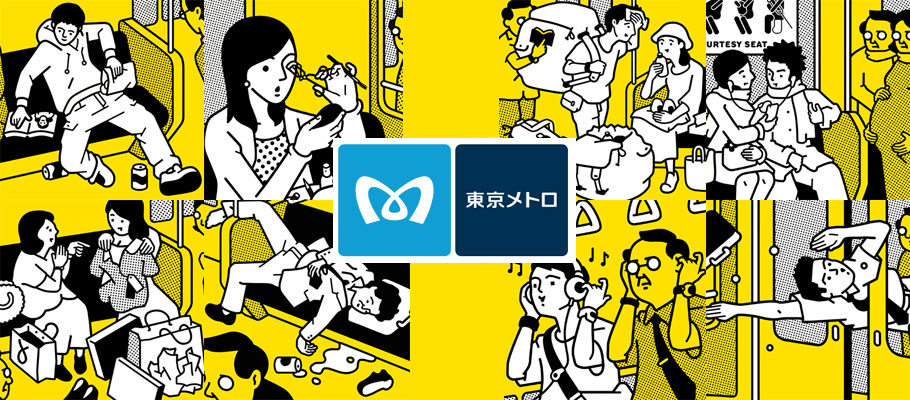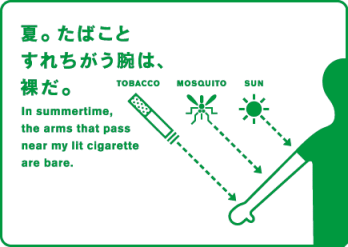Ask someone to describe the Japanese people in ten words or fewer and more often than not ‘polite’ or ‘reserved’ will appear somewhere in the mix. Japan is known the world over as a safe, pleasant place to live where people are on the whole helpful and courteous; few people visit Japan and return home with tales of rude airport staff or inattentive waitresses.
When I first came to Japan, I had the pleasure of living for five years in a pretty little town in Fukushima Prefecture, surrounded by rice fields, rivers and some of the deepest greens I have ever seen. Of course, I experienced the warmth of locals’ hospitality and kindness first-hand, but it was only in when I moved south to Tokyo in 2011 that I came to understand the real meaning of the word manā (‘manner’), and began to appreciate how much more important it is in urban living.
An English word adopted into the Japanese lexicon, manā is used to describe everything from not sticking your chopsticks upright in a bowl of rice to putting your mobile phone in discreet mode during a meeting. During my time in Fukushima, I had become accustomed to Japanese customs and rules of social etiquette — saying ‘itadakimasu’ and ‘gochisousama deshita’ before and after a meal, respectively; reversing into a parking space so as not to make others wait while I reversed out later; saying ‘ojama shimasu’ when entering someone’s home or office — but city ‘manner’, I soon came to realise, is an entirely different beast.
With its population of more than 12 million, to say that Tokyo is crowded would be putting it mildly. Add an extra 3 million to that figure to include those commuting into the city from outside areas each day to arrive at a staggering 15 million. With so many people squeezed into such a small space, it’s little wonder that manners are such an important a part of daily life.
Every year, numerous surveys are carried out both by independent groups of statisticians and the three big rail companies–JR (Japan Rail), Keio, and Odakyu. Their goal: finding out what really gets on commuters’ nerves.
When it comes to interaction with other people and a lack of personal space, nothing can trump the rush-hour trains in Tokyo, so it’s only natural that, crammed into these steel tubes twice a day, five days a week, little annoyances are eventually going to take their toll on commuters. With this in mind, transport companies endeavour to keep abreast of the things that irk their customers, and hopefully take steps to dissuade such activities.
So what really ticks Tokyo’s commuters off? Of all the surveys and tables of data published in the last few years, the most common annoyances reported include:
1. People eating and drinking on the train
2. Not waiting for others to alight before boarding
3. Not removing backpacks when it’s crowded
and my own personal pet hate
4. Listening to music too loudly through headphones.
On those busy trains, there’s plenty to get on your nerves before long, it would seem.
But these are all merely insignificant niggles when compared to the two top-ranking offenders, which have remained unchanged for years: ‘using mobile phones,’ and ‘sitting inconsiderately and taking up seats.’
▼ Japan Tobacco’s posters usually focus on issues of safety and etiquette
Mobile phones are nothing new, but since the birth of the smartphone, allowing us to browse the internet, check our Facebook account or tweet about the annoying guy beside us who keeps peering at our screen, just about everyone has a mobile in their hand during their commute. While operating a mobile phone inside a train is not in itself considered rude, talking on the phone, or allowing it to ring, beep, or — as once happened to me and caused me a great deal of embarrassment — accidentally play an obnoxiously loud YouTube video, is a definite no-no.
Perhaps the reason Japanese people have such a reputation for impeccable politeness and consideration is due to the very architecture and shape of their society. In city areas, where land is sold at a premium and buildings are designed with ever-ingenious space-saving features, people often live in extremely close proximity to others. Thinking about others and how one’s own actions may affect, or bother, those around us, is more of a necessity here than it is in many developed countries. So when people violate these codes of conduct it stands out.
A friend of mine once told me of an incident he’d witnessed on his way to work that at once surprised him and made his day. On a crowded Shinjuku Station platform early one weekday morning, a pair of young foreigners were waiting for a train, both looking a little dishevelled as though they were making their way home after a night on the town. The taller of the two lit a cigarette and started smoking, seemingly oblivious to the glares he was receiving from those around him. Mere seconds later their train pulled into the station, so, with no time to finish his cigarette, the young man threw it on the ground, gave it a half-hearted stamp and moved to board the train.
To their right, a young Japanese couple looked on, their expressions a mixture of anger and frustration. The smoker suddenly noticed the couple looking between him and his discarded cigarette, but merely affected an apologetic smile while putting his hands together and making a small, sarcastic bow. Chuckling, he and his friend jumped on the train.
My friend was about to lose his temper, and felt that, as a foreigner himself, he ought to say something. But before he could even open his mouth, the young Japanese woman had already walked over to the discarded cigarette and picked it up. She hopped on the train after the pair, approached the smoker and calmly popped the cigarette into his breast pocket, before turning on her heel and stepping off the train. The doors closed and the train swept the young men, literally open mouthed, out of the station. The young woman, meanwhile, rejoined her partner wearing a huge grin and exchanged a cheesy high-five.
It’s still rare to see people take a stand like this, especially since incidents of gyaku-gire (where the offender turns angry after being reproached) are being reported more and more in the news, and it is simply not in most Japanese people’s nature to cause a scene in public, but there is a definite feeling of transition in the air in Tokyo when it comes to upholding rules with regard to appropriate manner. Of course, it would be wrong to suggest that all Japanese are champions of courtesy and politeness (nor do I share my friend’s story to suggest that non-Japanese are the villains here), and there are plenty of people who will happily ignore the rules, but these occasional outbursts seldom go unnoticed. In a city where people spend the vast majority of their time either in shared spaces while at work or commuting, or in close proximity to others while living in apartment-stlye housing, it’s difficult to imagine Tokyo functioning any other way.
▼Tokyo Metro’s famous ‘Do it at Home’ poster campaign

Smoking has been prohibited in Tokyo’s stations since 2009 after many complained of passive smoke while waiting for their trains. And while it’s still legal to smoke in many publics places like restaurants and izakayas, attitudes are slowly changing. A number of cities within the Tokyo area, for instance, now have no smoking emblems emblazoned on many roadways and pavements, and people are asked to smoke only in designated smoking areas. Anti-smoking poster campaigns, which are almost always based on manners and public perceptions of smokers rather than health risks, are a regular sight around stations, especially Japan Tobacco’s now famous ‘green men’ posters, that warn smokers about everything from breaking a child’s heart by putting out a cigarette in the snowman they built, to looking un-cool by tossing a butt on the ground like the hero in an antiquated cowboy film. Similarly, Tokyo Metro’s Ie de Yarou poster campaign goes some way towards showing how important ‘manner’ is in Japanese commuting life by depicting various anti-social acts such as falling asleep drunk, taking seats meant for disabled or elderly passengers, or applying make-up on the train (although personally I don’t have an issue with someone wanting to add a little mascara while commuting…), and politely asks ‘Please do it at home.’ It’s clear that, in the land where trains run on time and people bow while talking on the phone, Japan’s society also relies heavily on co-operation and the consideration of others.
So remember, kids: remove your backpack when it’s crowded, switch your phone to manner mode and get ready to give up your seat to an old lady. Chances are if you don’t, someone nearby might be working up the courage to tell you to.
Insert images InventorSpot, Kanpai


 Company’s smoking regulations cover all bases with math, technology, psychology, and courtesy
Company’s smoking regulations cover all bases with math, technology, psychology, and courtesy Japanese organization wants stricter regulations against people smoking on their own balconies
Japanese organization wants stricter regulations against people smoking on their own balconies Japan’s cigarette culture: elderly ramen customer’s gesture of courtesy goes up in smoke
Japan’s cigarette culture: elderly ramen customer’s gesture of courtesy goes up in smoke Japanese zoo’s “Smoker Enclosure” sign taken down
Japanese zoo’s “Smoker Enclosure” sign taken down Shinjo City shares its love with anti-smoking poster
Shinjo City shares its love with anti-smoking poster How to order snacks on a Shinkansen bullet train in Japan
How to order snacks on a Shinkansen bullet train in Japan New Nintendo Lego kit is a beautiful piece of moving pixel art of Mario and Yoshi【Photos】
New Nintendo Lego kit is a beautiful piece of moving pixel art of Mario and Yoshi【Photos】 Demon Slayer: Kimetsu no Yaiba gets new roller coaster attractions and food at Universal Studios Japan
Demon Slayer: Kimetsu no Yaiba gets new roller coaster attractions and food at Universal Studios Japan New samurai glasses are Japan’s latest weird must-have souvenir
New samurai glasses are Japan’s latest weird must-have souvenir Finally! Nintendo Japan expands Switch 8-bit controller sales to everybody, Online member or not
Finally! Nintendo Japan expands Switch 8-bit controller sales to everybody, Online member or not Apartment in Japan explodes following bizarre series of events【Video】
Apartment in Japan explodes following bizarre series of events【Video】 McDonald’s adds a new Cheese Bacon Potato Pie to its menu in Japan for a limited time
McDonald’s adds a new Cheese Bacon Potato Pie to its menu in Japan for a limited time Nintendo history you can feel – Super NES, N64, and GameCube controllers become capsule toys
Nintendo history you can feel – Super NES, N64, and GameCube controllers become capsule toys Tokyo Station’s perfect breakfast spot might just be this izakaya Japanese-style pub
Tokyo Station’s perfect breakfast spot might just be this izakaya Japanese-style pub High-fashion Totoro cuddle purse is like an elegant stroll in the forest【Photos】
High-fashion Totoro cuddle purse is like an elegant stroll in the forest【Photos】 Hello, cosmetics! Clinique teams up with Hello Kitty this summer for first-time collaboration
Hello, cosmetics! Clinique teams up with Hello Kitty this summer for first-time collaboration “The most Delicious Cup Noodle in history” – Japan’s French Cup Noodle wins our heart【Taste test】
“The most Delicious Cup Noodle in history” – Japan’s French Cup Noodle wins our heart【Taste test】 Starbucks releases a cute Frappuccino and Unicorn Cake…but not in Japan
Starbucks releases a cute Frappuccino and Unicorn Cake…but not in Japan Kyoto Tower mascot termination reveals dark side behind cute Japanese characters
Kyoto Tower mascot termination reveals dark side behind cute Japanese characters McDonald’s Japan’s Soft Twist Tower: A phantom ice cream only sold at select branches
McDonald’s Japan’s Soft Twist Tower: A phantom ice cream only sold at select branches Yabai Ramen: What makes this Japanese ramen so dangerous?
Yabai Ramen: What makes this Japanese ramen so dangerous? Japanese government wants to build luxury resorts in all national parks for foreign tourists
Japanese government wants to build luxury resorts in all national parks for foreign tourists To combat declining birth rate, Japan to begin offering “Breeding Visas” to foreigners
To combat declining birth rate, Japan to begin offering “Breeding Visas” to foreigners 10 things you should buy at 7-Eleven in Japan
10 things you should buy at 7-Eleven in Japan Studio Ghibli releases anime heroine cosplay dresses that are super comfy to wear
Studio Ghibli releases anime heroine cosplay dresses that are super comfy to wear Woman charged for driving suitcase without a license in Osaka
Woman charged for driving suitcase without a license in Osaka Studio Ghibli unveils My Neighbour Totoro miniature house model
Studio Ghibli unveils My Neighbour Totoro miniature house model Kyoto experiencing problems with foreign tourists not paying for bus fares, but not on purpose
Kyoto experiencing problems with foreign tourists not paying for bus fares, but not on purpose Fighting mild hunger with a Japanese soda that turns into jelly in the stomach【Taste test】
Fighting mild hunger with a Japanese soda that turns into jelly in the stomach【Taste test】 Studio Ghibli’s Howl’s Moving Castle tapestry unveiled in Japan for first time
Studio Ghibli’s Howl’s Moving Castle tapestry unveiled in Japan for first time McDonald’s new Happy Meals offer up cute and practical Sanrio lifestyle goods
McDonald’s new Happy Meals offer up cute and practical Sanrio lifestyle goods Sales of Japan’s most convenient train ticket/shopping payment cards suspended indefinitely
Sales of Japan’s most convenient train ticket/shopping payment cards suspended indefinitely Sold-out Studio Ghibli desktop humidifiers are back so Totoro can help you through the dry season
Sold-out Studio Ghibli desktop humidifiers are back so Totoro can help you through the dry season Japanese government to make first change to romanization spelling rules since the 1950s
Japanese government to make first change to romanization spelling rules since the 1950s Foreigner’s request for help in Tokyo makes us sad for the state of society
Foreigner’s request for help in Tokyo makes us sad for the state of society Ghibli founders Toshio Suzuki and Hayao Miyazaki contribute to Japanese whisky Totoro label design
Ghibli founders Toshio Suzuki and Hayao Miyazaki contribute to Japanese whisky Totoro label design Doraemon found buried at sea as scene from 1993 anime becomes real life【Photos】
Doraemon found buried at sea as scene from 1993 anime becomes real life【Photos】 Tokyo’s most famous Starbucks is closed
Tokyo’s most famous Starbucks is closed Princesses, fruits, and blacksmiths: Study reveals the 30 most unusual family names in Japan
Princesses, fruits, and blacksmiths: Study reveals the 30 most unusual family names in Japan Social experiment in India reveals smokers’ true feelings about their lethal habit
Social experiment in India reveals smokers’ true feelings about their lethal habit Japanese sake brewed to pair with cocoa cigarettes
Japanese sake brewed to pair with cocoa cigarettes Tokyo curry restaurant refuses to serve any customer with a strong odor
Tokyo curry restaurant refuses to serve any customer with a strong odor Train etiquette poster features legendary Japanese folklore hero in an unusual plot twist
Train etiquette poster features legendary Japanese folklore hero in an unusual plot twist Japanese man astounds Internet by levitating paper cup and cigarette in mid-air【Video】
Japanese man astounds Internet by levitating paper cup and cigarette in mid-air【Video】 Chinese couple’s suicide attempt leads to serious injury, criminal charges, and $24,000 in damages
Chinese couple’s suicide attempt leads to serious injury, criminal charges, and $24,000 in damages Rules of tea, business cards, and bowing – 10 Japanese business manners young people are tired of
Rules of tea, business cards, and bowing – 10 Japanese business manners young people are tired of Disturbing video shows man hitting woman for crossing her legs on Japanese train【Video】
Disturbing video shows man hitting woman for crossing her legs on Japanese train【Video】 Inconsiderate commuter behavior in Korea – A photo guide
Inconsiderate commuter behavior in Korea – A photo guide Rubbernecking gone too far? Net users react to crowds taking pics of train hit by suicide jumper
Rubbernecking gone too far? Net users react to crowds taking pics of train hit by suicide jumper Japan bad train manners survey reminds us of three things to watch out for while riding the rails
Japan bad train manners survey reminds us of three things to watch out for while riding the rails Kyoto has had enough of rude tourists, created an infographic to show how to visit politely
Kyoto has had enough of rude tourists, created an infographic to show how to visit politely Quiz of the Week: Round 6 (Now made with the tears of sad children*)
Quiz of the Week: Round 6 (Now made with the tears of sad children*) Japanese workers reveal the 8 most astonishing things new employees do in the workplace
Japanese workers reveal the 8 most astonishing things new employees do in the workplace Japanese train company slammed for ad branding women “undignified” for applying makeup on board
Japanese train company slammed for ad branding women “undignified” for applying makeup on board Photo of man taking a dump on Tokyo subway floor is full of amusing background details
Photo of man taking a dump on Tokyo subway floor is full of amusing background details
Leave a Reply